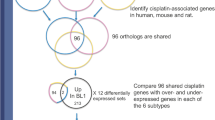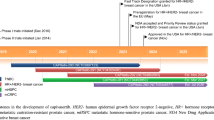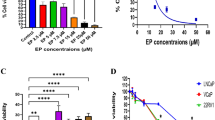Abstract
Treatments that target the androgen axis represent an effective strategy for patients with advanced prostate cancer, but the disease remains incurable and new therapeutic approaches are necessary. Significant advances have recently occurred in our understanding of the growth factor and signaling pathways that are active in prostate cancer. In conjunction with this, many new targeted therapies with sound preclinical rationale have entered clinical development and are being tested in men with castration-resistant prostate cancer. Some of the most relevant pathways currently being exploited for therapeutic gain are HGF/c-Met signaling, the PI3K/AKT/mTOR pathway, Hedgehog signaling, the endothelin axis, Src kinase signaling, the IGF pathway, and angiogenesis. Here, we summarize the biological basis for the use of selected targeted agents and the results from available clinical trials of these drugs in men with prostate cancer.

Similar content being viewed by others
References
Siegel, R., Naishadham, D., & Jemal, A. (2013). Cancer statistics, 2013. CA: A Cancer Journal for Clinicians, 63(1), 11–30.
Semenza, G. L. (2003). Targeting HIF-1 for cancer therapy. Nature Reviews Cancer, 3(10), 721–732.
Ferrer, F. A., Miller, L. J., Andrawis, R. I., Kurtzman, S. H., Albertsen, P. C., et al. (1997). Vascular endothelial growth factor (VEGF) expression in human prostate cancer: in situ and in vitro expression of VEGF by human prostate cancer cells. The Journal of Urology, 157(6), 2329–2333.
Ferrer, F. A., Miller, L. J., Lindquist, R., Kowalczyk, P., Laudone, V. P., et al. (1999). Expression of vascular endothelial growth factor receptors in human prostate cancer. Urology, 54(3), 567–572.
Kelly, W. K., Halabi, S., Carducci, M., George, D., Mahoney, J. F., et al. (2012). Randomized, double-blind, placebo-controlled phase III trial comparing docetaxel and prednisone with or without bevacizumab in men with metastatic castration-resistant prostate cancer: CALGB 90401. Journal of Clinical Oncology, 30(13), 1534–1540.
Sandler, A., Gray, R., Perry, M. C., Brahmer, J., Schiller, J. H., et al. (2006). Paclitaxel-carboplatin alone or with bevacizumab for non-small cell lung cancer. New England Journal of Medicine, 355(24), 2542–2550.
Tannock I., Fizazi K., Ivanov S., Karlsson C., Flechon A., et al. (2013). Aflibercept versus placebo in combination with docetaxel/prednisone for first-line treatment of men with metastatic castration-resistant prostate cancer: Results from the multinational phase III trial (VENICE). Journal of Clinical Oncology, 31 (6 Suppl.), Abstract 13.
Ou Y., Michaelson M.D., Sengelov L., Saad F., Houede N., et al. (2011). Randomized, placebo-controlled, phase III trial of sunitinib in combination with prednisone versus prednisone alone in men with progressive metastatic castration-resistant prostate cancer. Journal of Clinical Oncology, 29 (15 Suppl.), Abstract 4515.
Aragon-Ching, J. B., Jain, L., Gulley, J. L., Arlen, P. M., Wright, J. J., et al. (2009). Final analysis of a phase II trial using sorafenib for metastatic castration-resistant prostate cancer. BJU International, 103(12), 1636–1640.
Beardsley, E. K., Hotte, S. J., North, S., Ellard, S. L., Winquist, E., et al. (2012). A phase II study of sorafenib in combination with bicalutamide in patients with chemotherapy-naïve castration resistant prostate cancer. Investigational New Drugs, 30(4), 1652–1659.
Dahut, W. L., Madan, R. A., Karakunnel, J. J., Adelberg, D., Gulley, J. L., et al. (2013). Phase II trial of cediranib in patients with metastatic castration-resistant prostate cancer. British Journal of Urology International, 111(8), 1269–1280.
Heath E.I., Mannuel H.D., Liu G., Lara P., Monk J.P., et al. (2013). Randomized phase II trial of docetaxel and prednisone with or without AZD2171, in chemotherapy-naïve, metastatic castrate-resistant prostate cancer. Journal of Clinical Oncology, 31 (6 Suppl.), Abstract 38.
Paravar, T., & Lee, D. J. (2008). Thalidomide: mechanisms of action. International Reviews of Immunology, 27(3), 111–135.
Garcia J.A., Elson P., Tyler A., Triozzi P., Dreicer R. (2013). Sargramostim (GM-CSF) and lenalidomide in castration-resistant prostate cancer: results from a phase I-II clinical trial. Urologic Oncology, in press.
Garcia J.A., Triozzi P., Elson P., Cooney M.M., Tyler A, et al. (2008). Clinical activity of ketoconazole and lenalidomide in castrate progressive prostate carcinoma: preliminary results of a phase II trial. Journal of Clinical Oncology, 26 (15 Suppl.), Abstract 5143.
Petrylak D.P., Fizazi K., Sternberg C.N., et al. (2012). A phase III study to evaluate the efficacy and safety of docetaxel and prednisone with or without lenalidomide in patients with castrate-resistant prostate cancer: The MAINSAIL trial. Meeting of the European Society of Medical Oncology, Vienna, Austria, September 28-October2, 2012, Abstract LBA24.
Isaacs, J. T. (2010). The long and winding road for the development of tasquinimod as an oral second-generation quinolone-3-carboxamide antiangiogenic drug for the treatment of prostate cancer. Expert Opinion on Investigational Drugs, 19(10), 1235–1243.
Pili, R., Haggman, M., Stadler, W. M., Gingrich, J. R., Assikis, V. J., et al. (2011). Phase II randomized, double-blind, placebo-controlled study of tasquinimod in men with minimally symptomatic metastatic castrate-resistant prostate cancer. Journal of Clinical Oncology, 29(30), 4022–4028.
Fagiani, E., & Christofori, C. (2013). Angiopoietins in angiogenesis. Cancer Letters, 328(1), 18–26.
Lind, A. J., Wikstrom, P., Granfors, T., Egevad, L., Stattin, P., et al. (2005). Angiopoietin 2 expression is related to histological grade, vascular density, metastases, and outcome in prostate cancer. The Prostate, 62(4), 394–399.
Herbst, R. S., Hong, D., Chap, L., Kurzrock, R., Jackson, E., et al. (2009). Safety, pharmacokinetics, and antitumor activity of AMG 386, a selective angiopoietin inhibitor, in adult patients with advanced solid tumors. Journal of Clinical Oncology, 27(21), 3557–3565.
Trusolino, L., Bertotti, A., & Comoglio, P. M. (2010). MET signaling: principles and functions in development, organ regeneration and cancer. Nature Reviews Molecular Cell Biology, 11(12), 834–848.
Scagliotti G.V., Novello S., & von Pawel J. (2013). The emerging role of MET/HGF inhibitors in oncology. Cancer Treatment Reviews, 39(7), 793-801.
Peters, S., & Adjei, A. A. (2012). MET: a promising anticancer therapeutic target. Nature Reviews. Clinical Oncology, 9(6), 314–326.
Jeffers, M., Schmidt, L., Nakaigawa, N., Webb, C. P., Weirich, G., et al. (1997). Activating mutations for the met tyrosine kinase receptor in human cancer. Proceedings of the National Academy of Sciences of the United States of America, 94(21), 445–450.
Knudsen, B. S., & Edlund, M. (2004). Prostate cancer and the Met hepatocyte growth factor receptor. Advances in Cancer Research, 91, 31–67.
Knudsen, B. S., Gmyrek, G. A., Inra, J., Scherr, D. S., Vaughan, E. D., et al. (2002). High expression of the Met receptor in prostate cancer metastasis to bone. Urology, 60(6), 1113–1117.
Verras, M., Lee, J., Xue, H., Li, T., Wang, Y., et al. (2007). The androgen receptor negatively regulates the expression of c-Met: implications for a novel mechanism of prostate cancer progression. Cancer Research, 67(3), 697–975.
Ryan, C. J., Rosenthal, M., Ng, S., Alumkal, J., Picus, J., et al. (2013). Targeted MET inhibition in castration-resistant prostate cancer: a randomized phase II study and biomarker analysis with rilotumumab plus mitoxantrone and prednisone. Clinical Cancer Research, 19(1), 215–224.
Kurzrock, R., Sherman, S. I., Ball, D. W., Forastiere, A. A., Cohen, R. B., et al. (2011). Activity of XL184 (Cabozantinib), an oral tyrosine kinase inhibitor, in patients with medullary thyroid cancer. Journal of Clinical Oncology, 29(19), 2660–2666.
Smith, D. C., Smith, M. R., Sweeney, C., Elfiky, A. A., Logothetis, C., et al. (2013). Cabozantinib in patients with advanced prostate cancer: results of a phase II randomized discontinuation trial. Journal of Clinical Oncology, 31(4), 412–419.
Yap, T. A., Olmos, D., Brunetto, A. T., Tunariu, N., Barriuso, J., et al. (2011). Phase I trial of a selective c-Met inhibitor ARQ197 incorporating proof of mechanism pharmacodynamic studies. Journal of Clinical Oncology, 29(10), 1271–1279.
Engelman, J. A. (2009). Targeting PI3K signaling in cancer; opportunities, challenges and limitations. Nature Reviews Cancer, 9(8), 550–562.
Courtney, K. D., Corcoran, R. B., & Engelman, J. A. (2010). The PI3K pathway as drug target in human cancer. Journal of Clinical Oncology, 28(6), 1075–1083.
Dancey, J. (2010). mTOR signaling and drug development in cancer. Nature Reviews. Clinical Oncology, 7(4), 209–219.
Taylor, B. S., Schultz, N., Hieronymus, H., Gopalan, A., Xiao, Y., et al. (2010). Integrative genomic profiling of human prostate cancer. Cancer Cell, 18(1), 11–22.
Amato, R. J., Jac, J., Mohammad, T., & Saxena, S. (2008). Pilot study of rapamycin in patients with hormone-refractory prostate cancer. Clinical Genitourinary Cancer, 6(2), 97–102.
Armstrong A.J., Shen T., Halabi S., Kemeny G., Bitting R.L., et al. (2013). A phase II trial of temsirolimus in men with castration-resistant metastatic prostate cancer. Journal of Clinical Oncology, 31 (6 Suppl.), Abstract 105.
Nakabayashi, M., Werner, L., Courtney, K. D., Buckel, G., Oh, W. K., et al. (2012). Phase II trial of RAD001 and bicalutamide for castration-resistant prostate cancer. BJU International, 110(11), 1729–1735.
Grunwald, V., DeGraffenried, L., Russel, D., Friedrichs, W. E., Ray, R. B., et al. (2002). Inhibitors of mTOR reverse doxorubicin resistance conferred by PTEN status in prostate cancer cells. Cancer Research, 62(21), 6141–6145.
Duran I., Montagut C., Calvo E., Galtes S., Navarrete A., et al. (2012). Overcoming docetaxel resistance in advanced castration-resistant prostate cancer (CRPC): A phase I/II trial of the combination of temsirolimus and docetaxel. Journal of Clinical Oncology, 30 (5 Suppl.), Abstract 250.
Carver, B. S., Chapinski, C., Wongvipat, J., Hieronymus, H., Chen, Y., et al. (2011). Reciprocal feedback regulation of PI3K and androgen receptor signaling in PTEN-deficient prostate cancer. Cancer Cell, 19(5), 575–586.
Maira, S. M., Stauffer, F., Brueggen, J., Furet, P., Schnell, C., et al. (2008). Identification and characterization of NVP-BEZ235, a new orally available dual phosphatidylinositol 3-kinase/mammalian target of rapamycin inhibitor with potent in vivo antitumor activity. Molecular Cancer Therapeutics, 7(7), 1851–1863.
Burris H., Rodon J., Sharma S., Herbst R.S., Tabernero J., et al. (2010). First-in-human phase I study of the oral PI3K inhibitor BEZ235 in patients with advanced solid tumors. Journal of Clinical Oncology, 28 (15 Suppl.), Abstract 3005.
Posadas, E. M., Gulley, J., Arlen, P. M., Trout, A., Parnes, H. L., et al. (2005). A phase II study of perifosine in androgen independent prostate cancer. Cancer Biology & Therapy, 4(10), 1133–1137.
Chee, K. G., Longmate, J., Quinn, D. I., Chatta, G., Pinski, J., et al. (2007). The AKT inhibitor perifosine in biochemically recurrent prostate cancer: a phase II California/Pittsburgh cancer consortium trial. Clinical Genitourinary Cancer, 5(7), 433–437.
Yap, T. A., Yan, L., Patnaik, A., Fearen, I., Olmos, D., et al. (2011). First-in-man clinical trial of the oral pan-AKT inhibitor MK-2206 in patients with advanced solid tumors. Journal of Clinical Oncology, 29(35), 4688–4695.
Bendell, J. C., Rodon, J., Burris, H. A., de Jonge, M., Verweij, J., et al. (2012). Phase I, dose-escalation study of BKM120, an oral pan-class I PI3K inhibitor, in patients with advanced solid tumors. Journal of Clinical Oncology, 30(3), 282–290.
Hong, D. S., Bowles, D. W., Falchook, G. S., Messersmith, W. A., George, G. C., et al. (2012). A multicenter phase I trial of PX-866, an oral irreversible phosphatidylinositol 3-kinase inhibitor, in patients with advanced solid tumors. Clinical Cancer Research, 18(15), 4173–4182.
Rubin, L. L., & de Sauvage, F. J. (2006). Targeting the hedgehog pathway in cancer. Nature Reviews Drug Discovery, 5(12), 1026–1033.
Kim, T. J., Lee, J. Y., Hwang, T. K., Kang, C. S., & Choi, Y. J. (2011). Hedgehog signaling protein expression and its association with prognostic parameters in prostate cancer: a retrospective study from the viewpoint of new 2010 anatomic stage/prognostic groups. Journal of Surgical Oncology, 104(5), 472–479.
Chen, M., Carkner, R., & Buttyan, R. (2011). The hedgehog/Gli signaling paradigm in prostate cancer. Expert Review of Endocrinology and Metabolism, 6(3), 453–467.
Ibuki, N., Ghaffari, M., Pandey, M., Iu, I., Fazli, L., et al. (2013). TAK-441, a novel investigational smoothened antagonist, delays castration-resistant progression in prostate cancer by disrupting paracrine hedgehog signaling. International Journal of Cancer, 133(8), 1955–1966.
Kim, J., Tang, J. Y., Gong, R., Kim, J., Lee, J. J., et al. (2010). Itraconazole, a commonly used antifungal that inhibits hedgehog pathway activity and cancer growth. Cancer Cell, 17(4), 388–399.
Aftab, B. T., Dombromilskaya, I., Liu, J. O., & Rudin, C. M. (2011). Itraconazole inhibits angiogenesis and tumor growth in non-small cell lung cancer. Cancer Research, 71(21), 6764–6772.
Antonarakis, E. S., Heath, E. I., Smith, D. C., Rathkopf, D., Blackford, A. L., et al. (2013). Repurposing itraconazole as a treatment for advanced prostate cancer: a noncomparative randomized phase II trial in men with metastatic castration-resistant prostate cancer. The Oncologist, 18(2), 163–173.
Wheeler, D. L., Iida, M., & Dunn, E. F. (2009). The role of Src in solid tumors. The Oncologist, 14(7), 667–678.
Park, S. I., Zhang, J., Phillips, K. A., Araujo, J. C., Najjar, A. M., et al. (2008). Targeting Src family kinases inhibits growth and lymph node metastases of prostate cancer in an orthotopic nude mouse model. Cancer Research, 68(9), 3323–3333.
Yu, E. Y., Wilding, G., Posadas, E., Gross, M., Culine, S., et al. (2009). Phase II study of dasatinib in patients with metastatic castration-resistant prostate cancer. Clinical Cancer Research, 15(23), 7421–7428.
Araujo, J. C., Mathew, P., Armstrong, A. J., Braud, E. L., Posadas, E., et al. (2012). Dasatinib combined with docetaxel for castration-resistant prostate cancer: results from a phase 1-2 study. Cancer, 118(1), 63–71.
Araujo J.C., Trudel G.C., Saad F., Armstrong A.J., Yu E.Y., et al. (2013). Overall survival and safety of dasatinib/docetaxel versus docetaxel in patients with metastatic castration-resistant prostate cancer: results from the randomized phase III READY trial. Journal of Clinical Oncology, 31 (6 Suppl.), Abstract LBA8.
Lara, P. N., Longmate, J., Evans, C. P., Quinn, D. I., Twardowski, P., et al. (2009). A phase II trial of the Src-kinase inhibitor AZD0530 in patients with advanced castration-resistant prostate cancer: a California Cancer Consortium study. Anti-Cancer Drugs, 20(3), 179–184.
Antonarakis E.S., Heath E.I., Posadas E.M., Harrison M.R., Bruce J.Y., et al. (2013). A phase 2 study of KX2-391, an oral inhibitor of Src kinase and tubulin polymerization, in men with bone-metastatic castration-resistant prostate cancer. Cancer Chemotherapy and Pharmacology, 71(4), 883–892.
Nelson, J., Bagnato, A., Battinstini, B., & Nisen, P. (2003). The endothelin axis: emerging role in cancer. Nature Reviews Cancer, 3(2), 110–116.
Fizazi, K. S., Higano, C. S., Nelson, J. B., Gleave, M., Miller, K., et al. (2013). Phase III, randomized, placebo-controlled study of docetaxel in combination with zibotentan in patients with metastatic castration-resistant prostate cancer. Journal of Clinical Oncology, 31(14), 1740–1747.
Nelson, J. B., Fizazi, K., Miller, K., Higano, C., Moul, J. W., et al. (2012). Phase 3, randomized, placebo-controlled study of zibotentan (ZD4054) in patients with castration-resistant prostate cancer metastatic to bone. Cancer, 118(22), 5709–5718.
Miller, K., Moul, J. W., Gleave, M., Fizazi, K., Nelson, J. B., et al. (2013). Phase III, randomized, placebo-controlled study of once-daily oral zibotentan (ZD4054) in patients with non-metastatic castration resistant prostate cancer. Prostate Cancer and Prostatic Diseases, 16(2), 187–192.
Nelson, J. B., Love, W., Chin, J. L., Saad, F., Schulman, C. C., et al. (2008). Phase 3, randomized, controlled trial of atrasentan in patients with non-metastatic, hormone-refractory prostate cancer. Cancer, 113(9), 2478–2487.
Quinn D.I., Tangen C.M., Hussain M., Lara P., Goldkorn A., et al. (2012). SWOG S0421: Phase III study of docetaxel and atrasentan versus docetaxel and placebo for men with advanced castrate resistant prostate cancer. Journal of Clinical Oncology, 30 (15 Suppl.), Abstract 4511.
Carducci, M. A., Saad, F., Abrahamsson, P. A., Dearnaley, D. P., Schulman, C. C., et al. (2007). A phase 3 randomized controlled trial of the efficacy and safety of atrasentan in men with metastatic hormone-refractory prostate cancer. Cancer, 110(9), 1959–1966.
Pollak, M. (2008). Insulin and insulin-like growth factor signaling in neoplasia. Nature Reviews Cancer, 8(12), 915–928.
Arcaro, A. (2013). Targeting the insulin-like growth factor-1 receptor in human cancer. Frontiers in Pharmacology, 4, 1–8.
Renehan, A. G., Zwahlen, M., Minder, C., O’Dwyer, S. T., Shalet, S. M., et al. (2004). Insulin-like growth factor (IGF)-1, IGF binding protein-3, and cancer risk: systematic review and meta-regression analysis. Lancet, 363(9418), 1346–1353.
Price, A. J., Allen, N. E., Appelby, P. N., Crowe, F. L., Travis, R. C., et al. (2012). Insulin-like growth factor-1 concentration and risk of prostate cancer: results from the European Prospective Investigation into Cancer and Nutrition. Cancer Epidemiology, Biomarkers & Prevention, 21(9), 1531–1541.
Krueckl, S. L., Sikes, R. A., Edlund, N. M., Bell, R. H., Hurado-Coll, A., et al. (2004). Increased insulin-like growth factor I receptor expression and signaling are components of androgen-independent progression in a lineage-derived prostate cancer progression model. Cancer Research, 64(23), 8620–8629.
Wu, J. D., Odman, A., Higgins, L. M., Haugk, K., Vessella, R., et al. (2005). In vivo effects of the human type I insulin-like growth factor receptor antibody A12 on androgen-dependent and androgen-independent xenograft human prostate tumors. Clinical Cancer Research, 11(8), 3065–3074.
O’Reilly, K. E., Rojo, F., She, Q., Solit, D., Mills, G. B., et al. (2006). mTOR inhibition induces upstream tyrosine kinase signaling and activates AKT. Cancer Research, 66(3), 1500–1508.
Higano C., Alumkal J., Ryan C.J., Yu E.Y., Beer T.M., et al. (2009). A phase II study evaluating the efficacy and safety of single agent IMC A12, a monoclonal antibody, against the insulin-like growth factor-1 receptor, as monotherapy in patients with metastatic, asymptomatic castration-resistant prostate cancer. Journal of Clinical Oncology, 27 (15 Suppl.), Abstract 5142.
Hussain M., Rathkopf D.E., Lui G., Armstrong A.J., Kelly W.K., et al. (2012). A phase II randomized study of cixutumumab or ramucirumab plus mitoxantrone and prednisone in patients with metastatic castrate-resistant prostate cancer following disease progression on docetaxel therapy. Journal of Clinical Oncology, 30 (5 Suppl.), Abstract 97.
Garcia J.A., Elson P., Cooney M.M, Tyler A.J., Rezash V., et al. (2013). A phase II study of linsitinib (OSI-906) in patients with asymptomatic or mildly symptomatic (non-opioid requiring) metastatic castrate resistant prostate cancer (CRPC). Journal of Clinical Oncology, 31 (6 Suppl.), Abstract 197.
Disclosures
The authors have no relevant conflicts of interest related to this work.
Author information
Authors and Affiliations
Corresponding author
Rights and permissions
About this article
Cite this article
Wozney, J.L., Antonarakis, E.S. Growth factor and signaling pathways and their relevance to prostate cancer therapeutics. Cancer Metastasis Rev 33, 581–594 (2014). https://doi.org/10.1007/s10555-013-9475-z
Published:
Issue Date:
DOI: https://doi.org/10.1007/s10555-013-9475-z




